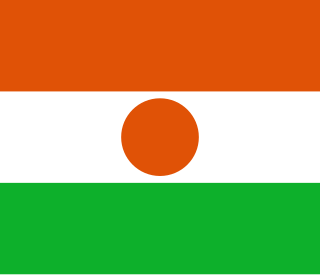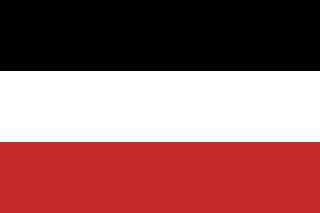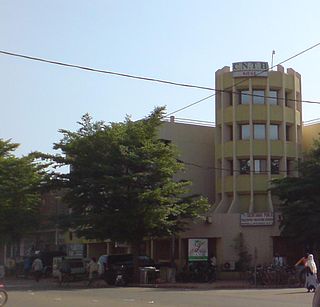
Maurice Yaméogo was the first President of the Republic of Upper Volta, now called Burkina Faso, from 1959 until 1966.
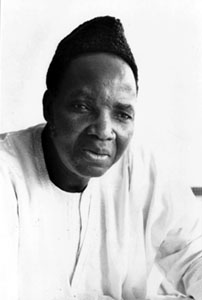
Joseph Ki-Zerbo was a Burkinabé historian, politician and writer. He is recognized as one of Africa’s foremost thinkers.
The National Organisations of Free Trade Unions (ONSL) is a trade union centre in Burkina Faso. It was founded in 1960, evolving out of the Confédération africaine des syndicats libres (CASL). It was initially named Union nationale des travailleurs de la Haute-Volta (UNTHV), adopting the name Organisation voltaïque des syndicats libres in 1964.

The Central Bank of West African States is a central bank serving the eight west African countries which share the common West African CFA franc currency and comprise the West African Economic and Monetary Union (UEMOA):

Revue Noire was a quarterly printed magazine dedicated to African contemporary art, published from 1991 to 2001 by Editions Revue Noire.
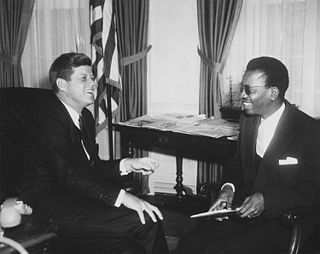
Frédéric Fernand Guirma is a diplomat, writer and politician from Burkina Faso. In 1959 he became the president of the trade union centre CATC. From 1960 to 1963 he was the Republic of Upper Volta's first Ambassador to the United States. He was also Permanent Representative to the United Nations. He heads the conservative political party Front de Refus or RDA. He gained 5.87% of the vote in the 1998 presidential election.
Ptychadena tournieri is a species of frog in the family Ptychadenidae. It is a widespread species in West Africa and found in Senegal, Gambia, Guinea-Bissau, Guinea, Sierra Leone, Liberia, and Ivory Coast, as well as in Togo and Benin; it is assumed to occur in Ghana and southeastern Burkina Faso, although it has not been recorded there. On the other hand, some records may refer to other species; the Amphibian Species of the World excludes Gambia and Togo from the distribution. Common names Liberia grassland frog and Tournier's rocket frog are sometimes used.
The West African Club Championship , also known as the General Eyadéma Cup, was a West African Club tournament from 1977 to 1999. It was open to league runners-up in the West Africa region of the CAF. While the first matches were played of the 2000 tournament, the competition was cancelled before the final, largely for financial reasons. While the intention of the CAF was to revive a national squad tournament in its place, the planned annual CSSA Nations Cup has not been regularly scheduled since. The tournament was resurrected in 2009 to pit each member country's highest team not featuring in the CAF Champions League or the CAF Confederation Cup. The final four was played in December with Togo as the host.
Confédération générale du travail du Burkina is a revolutionary national trade union centre in Burkina Faso. Bassolma BAZIE the general secretary of CGT-B.
The Confédération générale des travailleurs africains was a trade union centre in French West Africa, in existence from 1956 to 1957.
The Black African Students Federation in France was an organization of African students in France. FEANF was influenced by the French Communist Party, and saw the struggle against French colonialism in Africa as part of a wider struggle against Western imperialism. FEANF played an important role for the formation of communist organizations in Francophone Africa. In addition, FEANF largely contributed to creating a centralized voice that united all African student groups in France, while their actions highlighted the greater disparities within the French colonial system.
Joseph Ouédraogo was a Burkinabè trade unionist and politician, active during the last years of the French Upper Volta and subsequently in the Republic of Upper Volta.
Confédération africaine des syndicats libres, initially 'Confédération africaine des syndicats libres-Force ouvrière, was an Africa confederation of trade unions. CASL-FO was founded in February 1958 as the African sections of the French trade union centre CGT-Force Ouvrière separated themselves from their mother organization. The new union confederation was founded at a conference in Abidjan February 8–9, 1958, with participation of the CGT-FO branches of Senegal, French Soudan, Upper Volta, Niger, Ivory Coast, Cameroon, Moyen-Congo and Ubangui-Shari. At the time of the founding of CASL-FO, the relationship of the new structure with the International Confederation of Free Trade Unions (ICFTU) and CGT-FO, was debated. In the end the conference resolved that CASL-FO and CGT-FO should have membership of ICFTU on equal footing.
The General Union of Negro African Workers, more widely known by its French name Union générale des travailleurs d'Afrique noire, was a pan-African trade union organization. Ahmed Sékou Touré was the main leader of the organization. In its heyday, around 90% of the trade unions in Francophone West Africa were affiliated to UGTAN.
Confédération nationale des syndicats du Mali was a trade union confederation in the Mali Federation. CNMS was founded at a congress in Dakar April 2–6, 1960, gathering all Senegalese and Soudanese trade unions except CATC. When the Mali Federation was dissolved CNSM was also disbanded and its constituents resumed independent activities.
The UGTAN-unitaire was a trade union centre in Senegal. UGTAN-unitaire was formed in January 1959 through a split away from UGTAN. The founder of UGTAN-unitaire was Alioune Cissé, erstwhile UGTAN general secretary. UGTAN-unitaire wanted to unite West African trade unions within the French Community, but maintain independence from external international bodies. Later in 1959, UGTAN-unitaire merged with another UGTAN splinter group, UGTAN-autonome, to form UGTS.
The Confédération africaine des travailleurs croyants de l'A.E.F was a trade union confederation in French Equatorial Africa. CATC was founded in Pointe-Noire January 2–6, 1957 by the branches of the French trade union centre C.F.T.C in Gabon, Moyen-Congo, Chad and Ubangi-Shari. Gilbert Pongault was the chairman of C.A.T.C-A.E.F. The C.A.T.C-A.E.F retained a separate organization from the West African C.A.T.C, which had been formed a few months earlier. The two organizations did however maintain contacts between each other, albeit the attitude of C.A.T.C.-A.E.F towards its counterpart was characterized by jealousy towards the stronger unions in West Africa.
Confédération africaine des travailleurs croyants-Republique Centrafricain was a national trade union centre in the Central African Republic. The organization emerged from the Ubangi-Shari branch of the French trade union centre CFTC, which became the Ubangi-Shari affiliate of the Confédération africaine des travailleurs croyants in 1957. CATC was affiliated to the International Federation of Christian Trade Unions.







